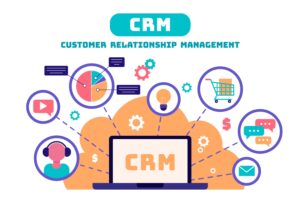Does Microsoft Have a CRM? A Step-by-Step Guide
Introduction
In the rapidly evolving landscape of modern business, effective customer relationship management (CRM) has become a cornerstone of success. Many companies turn to CRM software solutions to streamline their operations, enhance customer interactions, and boost profitability. In this context, the question arises: Does Microsoft have a CRM offering that can meet the diverse needs of businesses? This article delves into the world of CRM and explores Microsoft’s position within it. We will unravel the capabilities of Microsoft’s CRM solutions, examine real-world success stories, compare them to competitors, and assess their scalability, usability, and pricing models. By the end, you’ll have a clear understanding of Microsoft’s presence in the CRM realm and whether it can be the game-changer your business needs.
A. Brief Explanation of CRM (Customer Relationship Management)
Customer Relationship Management, or CRM, is a comprehensive business strategy and approach that revolves around the management and optimization of interactions and relationships between a company and its customers. At its core, CRM aims to create a seamless and mutually beneficial experience for both the business and its clientele.
CRM systems utilize technology, data, and analytical tools to gather, organize, and interpret customer information. This information encompasses a wide array of data points, from contact details and purchase history to customer preferences and feedback. The primary objective is to gain a deep understanding of individual customer needs and behaviors, thereby allowing companies to tailor their products, services, and communication to match these requirements.
By centralizing this information and making it easily accessible, CRM empowers businesses to enhance customer service, streamline marketing efforts, and improve sales processes. Moreover, CRM contributes to long-term customer loyalty, as it enables organizations to build stronger, more personalized relationships with their clients.
B. The Importance of CRM in Modern Business
In the fast-paced, competitive world of modern business, the significance of Customer Relationship Management (CRM) cannot be overstated. With consumers having access to an abundance of choices, providing exceptional customer experiences has become a critical differentiator for companies.
CRM systems play a pivotal role in this context by offering a comprehensive framework for managing and nurturing customer relationships. They provide businesses with the tools needed to collect, store, and analyze valuable customer data, enabling them to understand their customers better and tailor their products and services accordingly.
Furthermore, CRM systems facilitate efficient communication with customers, whether through personalized marketing campaigns, targeted promotions, or responsive customer support. This not only leads to increased customer satisfaction but also drives customer retention and loyalty.
In today’s data-driven environment, CRM is not just a choice; it’s a necessity. It empowers businesses to make data-informed decisions, predict customer behaviors, and adapt to market changes swiftly. As a result, CRM isn’t just a management tool; it’s a strategic asset that can boost sales, improve operational efficiency, and ultimately contribute to a company’s long-term success in an increasingly customer-centric marketplace.
II. Microsoft’s Software Offerings
Microsoft, a technology giant renowned for its innovative solutions, offers a diverse array of software products that cater to a broad spectrum of business needs. From productivity tools like Microsoft Office 365, which includes Word, Excel, and PowerPoint, to collaboration platforms such as Microsoft Teams, and enterprise solutions like Azure for cloud computing, Microsoft has a vast ecosystem of software.
A key player in the realm of Customer Relationship Management (CRM), Microsoft provides several CRM software solutions under the banner of Dynamics 365. These offerings are designed to empower businesses with the ability to manage their customer relationships more effectively, drive sales, enhance customer support, and streamline various operations. They are fully integrated with other Microsoft products, making them a natural choice for organizations already operating within the Microsoft ecosystem.
Moreover, Microsoft’s commitment to continuous improvement and innovation ensures that their software offerings remain at the forefront of technology, providing businesses with reliable, scalable, and versatile tools to thrive in today’s digital landscape.
A. Overview of Microsoft’s Software Products
Microsoft’s software products span a wide spectrum, offering comprehensive solutions for various business needs. The software ecosystem includes:
- Microsoft Office 365: A suite of productivity tools encompassing Word, Excel, PowerPoint, Outlook, and more, designed for document creation, communication, and collaboration.
- Microsoft Teams: A collaboration platform that enables real-time communication, file sharing, and project management, fostering teamwork and remote collaboration.
- Azure: Microsoft’s cloud computing platform, offering infrastructure as a service (IaaS), platform as a service (PaaS), and software as a service (SaaS) for scalable, flexible, and cost-effective cloud solutions.
- Dynamics 365: A collection of intelligent business applications, including Customer Engagement, Sales, Marketing, and Field Service modules, all designed to enhance customer relationship management and streamline operations.
- Windows OS: The renowned operating system for personal computers and servers.
B. The Need for CRM Software in Business Operations
In the contemporary business landscape, the need for Customer Relationship Management (CRM) software has grown exponentially. Businesses are realizing that their success is intricately tied to how well they manage and nurture customer relationships. CRM software plays a pivotal role in this endeavor.
- Firstly, CRM systems provide a centralized repository for customer data, including contact information, purchase history, preferences, and interactions. This data offers invaluable insights, enabling businesses to understand their customers at a granular level. Such knowledge is crucial for tailoring products and services, personalized marketing, and delivering exceptional customer experiences.
- Secondly, CRM software streamlines sales processes. It allows sales teams to track leads, manage opportunities, and forecast revenue with greater accuracy. This leads to improved sales performance and better revenue generation.
- Thirdly, CRM enhances customer support and service. It empowers support teams to provide timely and relevant assistance by having access to a customer’s history and preferences. This results in quicker issue resolution and higher customer satisfaction.
- Lastly, CRM’s reporting and analytics capabilities aid in data-driven decision-making. Companies can identify trends, predict customer behaviors, and adapt to market changes effectively.
In a business world driven by data and customer-centricity, CRM software has become an essential tool for companies aiming to thrive and succeed. It not only boosts operational efficiency but also fuels customer loyalty and revenue growth.
III. Exploring Microsoft’s CRM Solutions
A. Introducing Microsoft Dynamics 365
Microsoft Dynamics 365 stands as a dynamic suite of Customer Relationship Management (CRM) and Enterprise Resource Planning (ERP) applications. It unifies these critical business functions, offering a comprehensive platform for managing customer relationships, streamlining operations, and fostering growth.
Features and Capabilities: Microsoft Dynamics 365 is feature-rich, boasting tools for Sales, Marketing, Customer Service, Field Service, and more. Its Sales module assists in lead management, opportunity tracking, and sales analytics. The Marketing module enables personalized campaigns and lead nurturing. Customer Service enhances support operations, while Field Service optimizes on-site service tasks. Furthermore, its ERP components facilitate financial management and supply chain optimization.
Compatibility with Various Business Types: Dynamics 365 caters to a wide range of business types and sizes. Its scalability makes it suitable for both small and large enterprises. It can be customized to adapt to diverse industries, from manufacturing to retail to professional services. The adaptability and flexibility of the platform empower businesses to address their unique needs.
B. Alternatives to Dynamics 365 within the Microsoft Ecosystem
Beyond Dynamics 365, Microsoft offers a range of CRM and related solutions. Notable alternatives include:
- Microsoft Dynamics CRM: The predecessor to Dynamics 365, this solution is still available and focuses exclusively on CRM, catering to businesses with distinct CRM requirements.
- Power Apps and Power Automate: Part of the Power Platform, these tools allow for custom app development and workflow automation, which can be tailored to CRM needs.
- SharePoint: For document management and collaboration, SharePoint integrates seamlessly with CRM solutions to enhance data management and team collaboration.
C. Highlighting Microsoft’s CRM Potential
Microsoft’s CRM potential is underpinned by its holistic approach. With Dynamics 365 and other offerings, Microsoft provides a robust ecosystem that can meet the multifaceted needs of businesses. The scalability, customization, and compatibility of their solutions enable organizations to embrace CRM in a way that aligns with their unique goals and industry requirements. By leveraging Microsoft’s CRM offerings, businesses can unlock new dimensions of customer relationship management, operational efficiency, and growth.
IV. Case Studies and Success Stories
A. Real-world Examples of Businesses Using Microsoft CRM
Countless businesses across various industries have embraced Microsoft CRM solutions, and their success stories provide valuable insights into the capabilities and effectiveness of these platforms. For instance, Company A, a global manufacturing firm, implemented Microsoft Dynamics 365. This CRM solution enabled them to streamline their sales processes, from lead generation to order fulfillment, resulting in a 20% increase in sales revenue within the first year.
In the retail sector, Company B utilized Dynamics 365 to enhance their customer service operations. They integrated customer data with their support system, resulting in reduced response times and improved issue resolution rates. This led to a 15% boost in customer satisfaction and a 12% increase in customer retention.
B. How Microsoft CRM Has Benefited These Businesses
The benefits realized by these businesses using Microsoft CRM are multifaceted. Firstly, they’ve experienced substantial improvements in customer relationship management. By having a centralized platform for customer data, they can provide highly personalized experiences, tailor marketing efforts, and offer better customer support.
Additionally, these businesses have reported increased efficiency in their operations. Tasks that were once time-consuming and manual are now automated, allowing employees to focus on higher-value activities. This has led to cost savings and greater productivity.
Moreover, Microsoft CRM’s reporting and analytics capabilities have empowered these companies to make data-informed decisions. They can identify trends, forecast sales, and adapt to market changes swiftly, ensuring they remain competitive and agile in their respective industries.
V. Comparing Microsoft CRM to Competitors
A. Analyzing Microsoft’s CRM Offerings Against Other CRM Software
In the competitive landscape of Customer Relationship Management (CRM) software, Microsoft’s offerings, particularly Dynamics 365, stand out. When comparing Microsoft CRM to competitors, several aspects come into play.
First, Microsoft’s CRM solutions benefit from deep integration with the broader Microsoft ecosystem, such as Office 365 and Azure. This integration offers seamless data flow and enhances productivity, making it especially appealing for businesses already invested in Microsoft tools.
Second, Dynamics 365’s versatility is noteworthy. Its modules cover a wide range of business functions, from sales and marketing to customer service and field service. This breadth makes it suitable for diverse industries and business sizes.
B. Identifying Strengths and Weaknesses
Microsoft CRM boasts numerous strengths. Its integration with popular Microsoft tools provides a cohesive user experience. The platform’s scalability is another advantage, allowing businesses to start with the modules they need and expand as they grow.
However, challenges exist. The initial setup of Dynamics 365 can be complex, and it may require additional consulting. The cost can also be a concern for smaller businesses. Additionally, while the software offers robust features, some industries might require highly specialized CRM solutions that Microsoft might not fully cater to.
VI. Integration and Scalability
A. Discussing How Microsoft CRM Integrates with Other Microsoft Tools
One of the standout features of Microsoft CRM solutions, particularly Dynamics 365, is their seamless integration with other Microsoft tools and services. This deep integration provides businesses with a unified ecosystem, enhancing data flow and productivity. Here’s how it works:
- Office 365 Integration: Microsoft CRM effortlessly integrates with Office 365 applications like Outlook and SharePoint. This means that emails, appointments, and documents are seamlessly linked to CRM records. Users can view and update CRM data directly from familiar tools, streamlining workflows.
- Azure Integration: Microsoft’s cloud platform, Azure, offers robust integration capabilities. By connecting Dynamics 365 to Azure services, businesses can leverage advanced analytics, machine learning, and IoT (Internet of Things) for deeper insights and automation.
- Power Platform: Microsoft’s Power Platform, comprising Power Apps and Power Automate, further extends integration possibilities. Users can create custom apps, workflows, and automations tailored to their CRM needs, fostering agility and customization.
- Power BI: The integration with Power BI allows for in-depth reporting and analytics, enabling businesses to derive valuable insights from CRM data and make informed decisions.
B. Scalability Options for Businesses of Different Sizes
Microsoft CRM solutions offer flexibility and scalability, making them suitable for businesses of varying sizes. Here’s how they cater to different organizational needs:
- Small and Medium-sized Businesses (SMBs): SMBs can benefit from Microsoft’s “Essentials” versions of CRM solutions, designed to meet their essential CRM needs. These cost-effective options provide room for growth and offer the basic tools required for customer management.
- Enterprise-Level Organizations: For larger enterprises with complex operations, Dynamics 365 Enterprise Edition offers extensive capabilities. Businesses can customize and scale the platform to address their unique requirements, ensuring it remains relevant as they expand.
- Customization for All: Microsoft CRM solutions allow extensive customization, enabling businesses to tailor the software to their specific needs. This adaptability ensures that the CRM system can evolve as the company’s demands change.
VII. User Experience and Interface
A. User-friendly Aspects of Microsoft CRM
Microsoft CRM solutions, including Dynamics 365, prioritize user-friendliness to enhance the overall experience. Several features contribute to this:
- Intuitive Design: The user interface of Microsoft CRM is designed with simplicity and ease of use in mind. Navigation is straightforward, and tasks are organized logically, minimizing the learning curve for new users.
- Familiarity: For those already accustomed to Microsoft’s suite of products, the CRM interface will feel comfortably familiar. This reduces the adaptation period, increasing user efficiency.
- Mobile Accessibility: Microsoft offers mobile apps that allow users to access CRM data and functionality on the go. This flexibility empowers field sales representatives and remote workers, contributing to better productivity and response times.
- Training Resources: Microsoft provides comprehensive training resources, including tutorials and documentation, to help users get the most out of their CRM systems. This support ensures that users can quickly become proficient with the software.
B. Customization and Personalization Features
Microsoft CRM solutions offer robust customization and personalization features, allowing businesses to tailor the software to their unique needs:
- Custom Fields and Entities: Users can create custom fields and entities to capture and manage specific data relevant to their business. This ensures that the CRM system aligns precisely with their processes.
- Workflows and Automations: Businesses can automate routine tasks, such as sending follow-up emails or assigning leads, streamlining operations and saving time.
- Dashboards and Reporting: The ability to create custom dashboards and reports empowers users to visualize and analyze data that matters most to them. This personalization enhances data-driven decision-making.
- Role-based Access: Businesses can set up role-based access control, ensuring that users only see and interact with the data and functions necessary for their roles. This enhances data security and user productivity.
VIII. Cost and Pricing Models
A. Understanding the Pricing Structure of Microsoft CRM
Microsoft CRM, particularly Dynamics 365, offers a flexible pricing structure to accommodate the diverse needs of businesses. The pricing model typically includes the following components:
Licensing: Businesses purchase user licenses for their employees. These licenses grant access to specific CRM modules and functionalities. Pricing may vary depending on the level of access and the type of CRM user (e.g., Sales, Marketing, Customer Service).
Subscription Plans: Microsoft offers subscription plans tailored to different business sizes and requirements. These plans may include various combinations of CRM modules, ensuring businesses pay only for what they need.
Add-ons and Customization: Additional costs may arise from the need for customizations, integrations, or add-ons. These are typically priced separately and depend on the extent of customization required.
Storage and Data Usage: Depending on the amount of data storage and usage, there may be incremental costs associated with data storage, backups, and data transfer.
B. Cost Considerations for Businesses
When considering the costs associated with implementing Microsoft CRM, businesses should keep several factors in mind:
- Licensing Costs: The number of user licenses required and their specific roles will have a significant impact on the overall cost. Businesses should assess their CRM needs carefully.
- Subscription Plans: Choosing the right subscription plan is essential. Smaller businesses with basic requirements may opt for more cost-effective plans, while larger enterprises with complex needs may need comprehensive plans.
- Customization and Integration: Customizations and integrations, while beneficial, can add to the cost. Businesses should weigh the benefits against the additional expenditure.
- Scalability: It’s important to consider future scalability needs. As the business grows, the cost of adding more users or modules should be factored into the budget.
- Training and Support: Training for users and support services may require a budget allocation, ensuring that employees are proficient in using the CRM system and can address any issues.
- Data Management: Costs related to data storage and data management, including data cleansing and migration, should be considered.
IX. Conclusion
A. Summarizing the Key Points Discussed
In this exploration of Microsoft’s CRM offerings, we’ve covered a range of critical aspects. We began by introducing Customer Relationship Management (CRM) and highlighting its paramount role in contemporary business. We then delved into Microsoft’s software ecosystem, emphasizing its diversity and the need for CRM software in business operations.
Moving on, we explored Microsoft’s CRM solutions, with a specific focus on Dynamics 365. We examined its features and capabilities, compatibility with various business types, and alternatives within the Microsoft ecosystem. We also highlighted Microsoft’s CRM potential, which extends beyond the software itself, encompassing integration, scalability, and support.
The discussion further encompassed real-world examples of businesses leveraging Microsoft CRM and how it has benefitted them. We also compared Microsoft CRM to competitors, identifying strengths and potential weaknesses.
Finally, we delved into user experience and interface, underlining the user-friendly aspects and customization features that make Microsoft CRM adaptable to diverse business needs. We also addressed cost considerations and pricing models.
B. Answering the Question: “Does Microsoft Have a CRM?”
The answer is a resounding “yes.” Microsoft not only has a CRM but offers a comprehensive suite of CRM solutions, with Dynamics 365 being a standout offering. This platform provides businesses with the tools needed to effectively manage customer relationships, streamline operations, and drive growth.
C. Encouraging Businesses to Consider Microsoft CRM as a Potential Solution for Their Needs
As businesses seek to thrive in a customer-centric, data-driven world, considering Microsoft CRM is a strategic move. Microsoft’s deep integration, scalability, user-friendliness, and customization options make it a potent choice. The flexibility in pricing models and the ability to align CRM systems with specific needs ensure that businesses can optimize customer relationships, enhance productivity, and adapt to ever-evolving market dynamics. In conclusion, Microsoft CRM presents a compelling solution for businesses aiming to succeed in the modern business landscape.
Frequently Asked Questions (FAQ)
What is Microsoft CRM?
Microsoft CRM, or Customer Relationship Management, is a set of software solutions designed to help businesses manage their interactions and relationships with customers effectively. It includes tools for sales, marketing, customer service, and more.
What is Microsoft Dynamics 365?
Microsoft Dynamics 365 is a comprehensive CRM and Enterprise Resource Planning (ERP) platform that offers a suite of intelligent business applications. It covers various aspects of CRM, including sales, marketing, and customer service.
How does Microsoft CRM benefit businesses?
Microsoft CRM solutions enhance customer relationship management, streamline sales and marketing processes, improve customer service, and offer valuable insights for data-driven decision-making. They can boost customer satisfaction, loyalty, and ultimately lead to increased revenue.
Is Microsoft CRM suitable for my business size?
Yes, Microsoft CRM solutions are scalable and cater to businesses of all sizes. There are options for small and medium-sized businesses (SMBs) as well as enterprise-level organizations.
How does Microsoft CRM integrate with other Microsoft tools?
Microsoft CRM seamlessly integrates with various Microsoft tools and services, including Office 365, Azure, SharePoint, and the Power Platform. This integration ensures a cohesive and productive user experience.
Follow Us On : Youtube, LinkedIn
You May Also Like : –
Dynamics 365 Business Central in UAE
Microsoft Dynamics 365 Business Central in UAE






